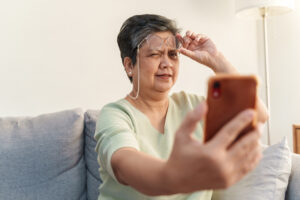Many Seniors Are Visually Impaired, Even With Glasses

Some vision impairment is a natural part of the aging process. Presbyopia often begins around age 45 but can be easily corrected with contacts or glasses. Recent research found that 28 percent of adults over 71 are visually impaired, even with the help of corrective lenses or visual aids.
Poor vision can be dangerous for older adults
The study used data from the National Health and Aging Trends Study. Olivia J. Killeen, MD, a Clinical Lecturer in the Department of Ophthalmology and Visual Sciences at Michigan Medicine, led the research, and the findings were published in JAMA Ophthalmology.
One of the main findings was that various types of visual impairment are linked to older age, lower income and less education. Non-Hispanic Black and Hispanic adults were likelier to have visual acuity and contrast sensitivity impairments than non-Hispanic White adults.
Many participants in the study needed an updated eyeglass prescription to treat their visual impairment, but some faced financial barriers. For example, many seniors have to pay for glasses because Medicare only provides eyeglass benefits after cataract surgery.
“These findings are important to address, as poor vision is associated with several adverse outcomes for older adults, including depression, dementia, falls, motor vehicle accidents and even death,” said Dr. Killeen.
Eye disease can cause vision impairment
The main cause of blindness and vision impairment in seniors is age-related eye disease. Cataracts, glaucoma and macular degeneration are three eye conditions that can develop as you age, and your risk increases after age 65.
Older adults with impaired vision also have a higher risk for the following:
- Injuries
- Social isolation
- Reduced quality of life
- Challenges with following instructions for medication
Comprehensive eye exams can prevent vision impairment
Has it been over a year since your last eye exam? Regular comprehensive eye exams with dilation can help detect vision problems and preserve your eyesight as you age. Eye conditions can develop slowly; therefore, you cannot rely on symptoms or warning signs, so call your ophthalmologist to make an appointment.
